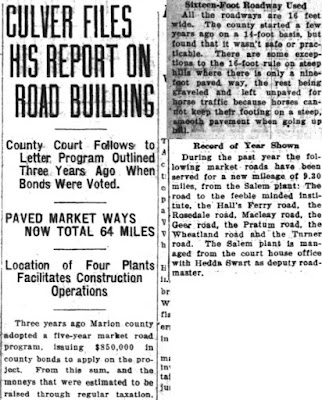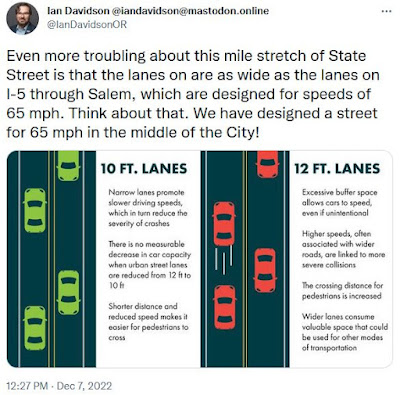The technical committee for our Metropolitan Planning Organization meets on Tuesday the 13th, and they'll be looking at a draft of Chapter 9, "Outstanding Issues," for the long-range Metropolitan Transportation Plan.
The biggest outstanding issue remains an elephant in the room. From here it looks like the institutional commitment to "consensus" too strongly influences the one chapter where conflict and dissent should be able to flower into expression.
 |
| Avoiding talk of GHG |
At the very end of the draft there is glancing reference to "Future Regulations," two short paragraphs on the prospect of new Federal rules and on the State's recently issued "Climate Friendly and Equitable Communities" rules.
This should be understood now as wholly inadequate. The biggest outstanding issue is how we are going to have to change our transportation system for climate action!
And there is dissent. Two members of the MPO, the City of Keizer and Marion County, filed suit to curb and even cancel the Climate Friendly and Equitable Communities rules. Isn't that also a relevant detail?
The plan's horizon is supposed be 2023-2050 or maybe 2023-2043, but whatever year you use as a terminus, over the next 20 or 25 years, climate is going to be a huge outstanding issue, not merely some minor technical point in a regulatory scheme.
The passive and too casual tone threads its way through other discussions.
On the matter of a "third bridge," finally moved from the definiteness of the chapter on "gaps" to this chapter for more nebulous "outstanding issues," it says "unless there is a significant shift in the travel demand and patterns...trips...across the bridges will increase...." And leaves it there.
 |
| And we aren't going to try to make that shift |
But it should now be clear that we are urgently called to create that shift in travel demand. The City of Salem's Climate Action Plan calls for a reduction in VMT. We must actively, positively enact policy that reduces travel demand for car trips and makes it easy to substitute other kinds of trips for car trips. How to do that is an outstanding issue for debate and analysis, but not that we need to do it.
Later, in a discussion of the Pandemic, there is again that passivity or helplessness. "During the pandemic...[there] was an increase in traffic fatalities that has continued...." But we aren't going to do very much about that, apparently.
 |
| And we are helpless about that increase |
It's as if merely taking note of these is sufficient, and that absolves us from taking any action on them as problems.
(Separately on the agenda is an update on the Metropolitan
Transportation Safety Action Plan, and there will be more to say about
that later. Here's a note on that from January 2021.)
The neutrality in the draft is too studied, and in fact expresses a drift to support the status quo, which is itself a policy preference and not neutrality.
If the whole tone cannot be adjusted, then the MPO should consider including section for a counterpoint styled as a minority report or dissent. At a minimum there should be a more contrapuntal structure so that other possibilities and perspectives, the reasons issues remain "outstanding," are at least visible. Even if the MPO wants a more uniform tone elsewhere, the chapter on "outstanding issues" is the proper place for clashing perspectives.
That approach for counterpoint peeks out a little in the discussion on Lancaster Drive.
 |
| Lancaster deserves a study |
Chapter 9 argues for a future planning study since "several intersections on Lancaster are consistently in the annual list of top ten crash locations."
Lancaster, more than Cordon Road, is the corridor that needs a study and revision!
Chapter 9 should be significantly revised for climate, and it should elevate for explicit discussion the tensions between the dominant frames of congestion relief and climate action. Resolving that tension is an outstanding issue, maybe the outstanding issue, and once that is done, the solution on many of the other "issues" will become much clearer. The tone should lean into the unresolved "outstandingness" of the issues much, much more.
 |
| Our Salem not in Cherriots Long Range Plan |
In the minutes to the last meeting there was a note about Our Salem and the Cherriots Long Range Plan.
Our Salem was "not available at the time the draft LRTP was developed."
That's not reason to delay the Long Range Plan a little? Why wasn't there better coordination since Our Salem was a known process when the Long Range Plan kicked off?
This is so very odd.
Finally, the theme of "cost escalation" continues, and I don't know that there is much in particular to say about it here, as "it is what it is." We should remember that after the Recession of 2008, lots of projects came in at bid under budget and "cost deescalation" allowed local governments to do a lot more. The flex in costing is cyclical and we are on the unfortunate part of the turn.
But it is interesting to note a detail on pavement width from 100 years ago.
 |
| December 10th, 1922 |
The County paved only 16 feet wide! These are rural roads. I am not sure the use of a center line was widespread yet, so we might think of these as having implied advisory lanes with cars in the center except when passing.
The exact dimension here of 16 feet is not important, but I cite it to underscore that our lane widths are generally still much too wide, and we could improve safety, reduce speeds, and reduce the cost of road work by narrowing travel lane widths.
 |
| Lanes routinely too wide - via Twitter |
The Technical Advisory Committee meets on Tuesday the 13th at 1:30pm. The agenda and packet can be downloaded here.


1 comment:
The minutes of the December meeting (published in the January TAC meeting packet) suggest the discussion of climate will be more robust in the next draft of Chapter 9:
"Julie Warncke provided feedback that the section on future regulations should be expanded to include the CFEC (Climate Friendly and Equitable Communities) work that the local jurisdictions are required to complete. Mr. Jackson mentioned that he will also move wording from an appendix to this chapter regarding climate change and greenhouse gases."
Post a Comment